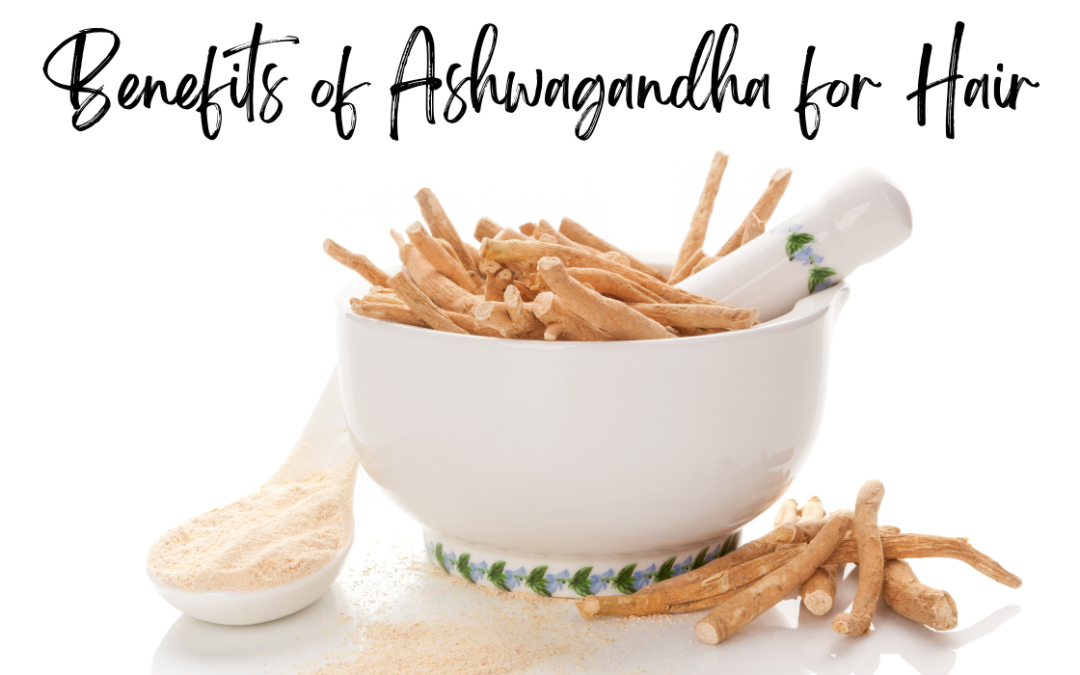Ashwagandha is an ancient herb which is in use since the inception of the ayurvedic system of medicine. It is a popular plant used for treatment of various health issues because of its medicinal properties. Not only is it beneficial for our mental health but also has multiple benefits for hair as well. There are numerous benefits of ashwagandha for hair.

Hair is one of the most important aspects of a human body. People face different issues related to hair like hair fall, hair thinning, receding hairline and others. But ashwagandha can be a remedy for your hair as well.
Ashwagandha is considered as an adaptogen and is attributed to help with anxiety and stress. Stress is the result of hormones like cortisol and ashwagandha helps to control the release of cortisol which leads to a relaxed mind. Stress can also lead to hair issues as it impacts your hair follicles resulting in hair thinning or hair fall. Ashwagandha helps to resolve such issues by controlling your stress. Below are a few ways how ashwagandha helps your hair and scalp health:
Reduces Stress:

Stress is associated with hair loss and other hair-related issues. Ashwagandha as an adaptogen can help curb stress which will indirectly reduce hair loss promoting your hair health. The ancient herb ashwagandha is also attributed as a rejuvenator giving a new life to your hair by making it healthy.
Balances Hormones:

Hair loss can be a result of hormonal imbalance. Ashwagandha can benefit your hair by regulating hormone levels, specifically cortisol, which is a stress hormone. The herb ashwagandha can benefit your hair by controlling the stress hormones.
Improves Scalp Circulation:

Improper blood circulation is one of the contributing factors to hair loss and thinning. Proper blood circulation to the scalp is essential for healthy hair growth. You can use ashwagandha oil to massage your hair to improve the blood circulation so your hair follicles can receive adequate supply of oxygen.
Antioxidant Properties:
Ashwagandha has anti-oxidizing properties. It helps to curb free radicals that are harmful for the scalp. Using ashwagandha in the form of powder to make a hair mask or simply apply ashwagandha hair oil can benefit your scalp by combating free radicals.
Nourishes Hair Follicles:

Ashwagandha is believed to nourish and strengthen hair follicles by combating free radicals, keeping your mind relaxed by controlling stress hormones and improving blood circulation to your scalp.
Anti-inflammatory Effects:
Ashwagandha can help reduce inflammation because it has anti-inflammatory properties. This can help prevent scalp infections caused due to inflammation. Inflammation is also responsible for disrupting hair growth cycles and one can face conditions like alopecia areata.
Availability of ashwagandha for hair care:

Ashwagandha is available in various forms for consumption in the market
Powder:
Ashwagandha powder is made by grinding the dried roots of the ashwagandha plant. It can be easily mixed into beverages like water, milk, or smoothies, or sprinkled over food. Some people prefer powder form for its versatility in dosage adjustment.
Capsules/Tablets:
Ashwagandha is also available in pre-measured capsule or tablet form, which offers convenience in dosage and ease of consumption. This form is particularly suitable for individuals who prefer a standardized dosage and don’t enjoy the taste of the powder.
Liquid Extracts/Tinctures:
Liquid extracts or tinctures of ashwagandha are concentrated forms of the herb dissolved in alcohol or water. They typically come with a dropper for easy and precise dosage. Liquid extracts may offer faster absorption compared to other forms.
Tea:
Ashwagandha tea is made by steeping ashwagandha roots or powder in hot water. It provides a soothing and calming way to consume ashwagandha, especially for those who enjoy herbal teas.
Topical Products:
While less common, there are also ashwagandha-infused topical products such as oils, creams, and hair masks designed for direct application to the skin or scalp. These products may provide benefits for skin and hair health when applied externally.
How to use ashwagandha for hair health?

Internal Consumption:
1. Ashwagandha Capsules or Tablets:
Ashwagandha capsules and tablets can be taken as per recommended dosage on the packing or you can take advice from a healthcare professional as well.
2. Ashwagandha Powder:
Take 1-2 teaspoons of ashwagandha powder into a glass of warm water, milk, or smoothie and mix it well. Consume this mixture daily at any time of the day for its potential hair benefits.
3. Ashwagandha Tea:
Ashwagandha tea bags are available in the market. You can start your day with this herbal tea to promote hair health.
Topical Application:
-
Ashwagandha Oil:
Ashwagandha oil can be massaged on the hair scalp for better hair health. It will help the hair follicles. You can keep the oil overnight or apply it 30-60 minutes before washing your hair.
-
Ashwagandha Hair Masks:
You can use ashwagandha oil with other hair-friendly ingredients like yogurt, honey, coconut oil, egg white to create a hair mask. Apply the mask on hair like the same way you apply other products, leave it for 30 minutes and wash it the way you do in your routine.
Conclusion:
Ashwagandha is one of the most beneficial herbs that can help your hair health. You can consume it orally or incorporate it in your lifestyle as a form of topical products.
Beneficial since centuries, ashwagandha has been a useful herb not just for hair but overall health as well. Incorporate ashwagandha to get many benefits of health and consult an expert if required.

